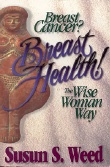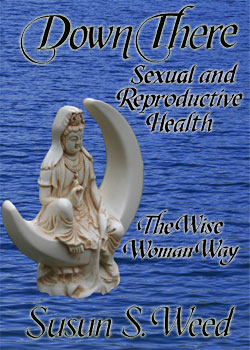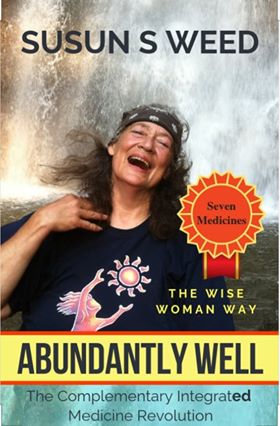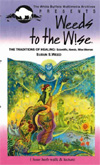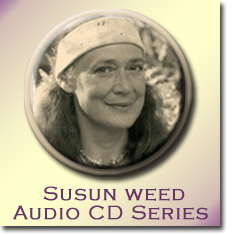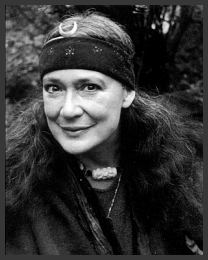www.susunweed.com
Herbal Adventures with Susun S Weed
The Rosaceae -- or rose -- family
as seen printed in www.sagewoman.com
Herbal medicine is people's medicine. And people's medicines are the medicines of the earth: the common weeds. Weeds, though often reviled, are powerhouses of nourishment, medicine, magic, and beauty. Their medicinal qualities, when wisely extracted and used, can counter major as well as minor disturbances of health.
But do beware! Eating weeds has been known to awaken the "wild woman" within. A wild woman may run with the wolves, or even howl with them. Who knows what she'll do if she eats weeds and gets loose!
Weeds in the rose family -- Rosaceae -- can certainly be triggers of wild and out-of-bounds behavior. Wild roses are particularly noted for inciting wild sensations in women. Look at how they spread their long limbs and intoxicating scent over everything. And what could be more feral, more dangerously wild than a blackberry patch? Brambles are in the rose family. At my brother's Oregon homestead, and along roadsides down under, blackberry canes grow as thick as my wrist and more than twice my height. . . overnight. That's wild -- untameable, uncivilized, uncultivated, unconquered -- indeed. Who knows what will happen if you inhale their perfumes, consume their flowers, make teas of their leaves, bite into their fruits. . . .
But inhale, consume, drink, and bite we do. The rose family lavishes such abundant love and rich fruitfulness on us -- who could resist her gifts? Who could refuse Rosaceae as juicy and delicious as peaches, apricots, cherries, plums, apples, pears, quinces, strawberries, blackberries, raspberries, rose hips, and almonds? Who would disdain to use Rosaceae as safe and effective raspberry leaves, hawthorn hips, peach pits, cinquefoil roots, and agrimony tops? Who is unaffected by the love magic of a deep red rose?
Thorny, exotic, and deeply nourishing to all the senses, the rose family invites you to a friendly, sensual, love-in.
Come, I'll introduce you.Almonds (Prunus dulcis). The only rose whose seeds we eat. One of my first teachers told me to "Eat three almonds a day to prevent cancer." She was right, too. Almonds contain numerous phytochemicals that are known to counter cancer. More prosaically, ground almonds are a superb skin scrub that removes blemishes while nourishing the skin deeply.
Apricots (Armeniaca vulgaris). Both fruits and pits are highly regarded as anticancer helpers. The FDA says apricot kernels are poisonous; nonetheless, you can buy them in Asian markets and through underground networks of those who believe in their value. Unsulphured dried apricots are a regular part of my anticancer lifestyle; I don't eat the pits.
Apple (Malus communis). An applea day keeps the doctor away and cancer at bay. Apples and apple products -- apple sauce, apple juice, apple cider vinegar -- contain special fruit acids that not only block cancer formation, but also help prevent recurrences after treatment.
Red cherries (Prunus), purple plums (Prunus), and red rose hips (Rosa rugosa). Th dark, rich colors of rose family fruits indicates the presence of especially potent antioxidants known to counter heart disease, cancer and cognitive deline.
Hawthorn (Crataegus species). Flowers, leaves, and fruits are all medicinal. Tincture of hawthorn berries is used worldwide to help lower high blood pressure, relieve congestive heart disease, and counter arteriosclerosis. A tea of dried hawthorn flowers and leaves is said to strengthen the heart muscle, ease anxiety, and sooth the grief of a broken heart.
Agrimony (Agrimonia eupatoria). Flowering tops of this garden weed are dried and brewed into a tea considered helpful for diabetics and others with spleen, kidney, or liver stress. Agrimony is most often used to ease the pain of gallstones and acid indigestion. Salve or oil of fresh agrimony in flower is said to relieve varicose veins.
Blackberry (Rubus villosus and other species). Root is a good choice for an astringent tincture. Prolonged use of a tea of the leaves is said to cure not only simple diarrhea, but even serious intestinal problems such as gastritis, colitis, and irritable bowel syndrome. If you chew fresh blackberry leaves to heal your bleeding gums, you'll be following a tradition which goes back to Biblical times.
Cinquefoil (Potentilla canadensis and other species). Roots and leaves, flowers and seeds can be made into a tincture or dried and brewed as a tea. Cinquefoil remedies provide a mild astringent action sufficient to check diarrhea, nose bleeds, and bleeding gums. Potentillas are wonderful in the garden, too, and many cultivars are available. They flower freely and continue flowering for months, even in dry, poor soils.
Raspberry (Rubus strigosus, R. ideaus and other species). Leaf infusion is a famous helper for pregnant women who want a well-toned uterus, and thus an easier birth. Raspberry infusion is used to prevent miscarriage when taken at the beginning of pregnancy, ease labor pains during the birth, and increase milk supply after. Some midwives rely on it to prevent postpartum depression. Fresh raspberries preserved in apple cider vinegar are a delicious heart tonic. Tincture of fresh raspberry offers fragrine, a tonifying alkaloid which strengthens the uterus and helps the hormones dance.
Rose (Rosa rugosa, R. canina and other species). Hips preserved in apple cider vinegar are a tasty immune system tonic. The buds of rose leaves put up in half glycerine and half water yield a superior hormonal tonic. My favorite rose treat? Rose petals preserved in honey. What a delicious way to strengthen my heart, my nerves, my glands, and my immune system. A cold compress of rose water is a lovely way to relieve a headache.
Rowan (Sorbus species). This most magical member of the Rosaceae family is also called mountain ash. It is said to protect high energy spots and to act as a guardian to the "gates between the worlds." The fruit is so high in vitamin C that it gave its name -- sorbus -- to the synthetic compound sold as vitamin C: ascorbic acid.
With their delicious fruits, powerful medicines, fragrant flowers, aids to beauty, and sweet magical sparkles, the Rosaceae have something for everyone. See if there isn't one growing by your doorstep, in your garden, in a vacant lot, along the road. Smell it, eat it, enjoy it. Let yourself be a little wild. Join the wild wise women who are reweaving the healing cloak of the Ancients and spreading
green blessings.
Dear Jade,
In the except of Breast Cancer? Breast Health! The Wise Woman Way by Susun S Weed included in your Blissful Times #13, a statement was made suggesting that herbal infused oils could be rubbed into the breasts as a treatment for "in situ" cancers. I know that the word "treatment" was never used, but to say that such oils ". . .help reverse abnormal cellular changes such as. . . in situ cancers" is tantamount to making that claim. I am quite certain that Susun would want to caution all who might read her excerpt or book that she in no way advocates using these oils as a treatment for any cancer in lieu of standard medical care. If read without sophistication and careful discernment, such a statement might inadvertently lead a woman with a known lesion to attempt treatment of it with herbal infused oils. As you and Susun must agree, that would never be a safe, desirable, or satisfactory treatment. While all of the benefits of wholesome pleasurable communication with and intimate knowledge of ones breasts cannot be doubted, one must raise a flag of caution when a deadly malignancy might be left untreated due to a misunderstanding of what is being advocated.
Respectfully, Steve Arthur, MD
Dear Steve,
Thank you for writing. You do not misunderstand what I advocate, although perhaps you apply it too broadly. I am speaking specifically about the questionable diagnosis of ductal carcinoma in situ. I do not agree with you that orthodox medicine knows the best way to treat this. I do not believe it is either safer and more effective than Wise Woman ways.
Our primary disagreement, however, is not so much on treatment but on the very nature of in situ ductal cancer. I understand that you honestly believe that this diagnosis is a "deadly malignancy." I don't. I believe that the vast majority of abnormal cells found in situ in the breast ducts are not true cancer cells and are not malignant until exposed to radiation (mammograms), biopsies, and surgery.
Consider these two articles from the many in my files and you will see why I urge women to avoid screening mammograms, and why I believe that a woman with a diagnosis of in situ ductal cancer will not find orthodox treatments "safe, desirable, or satisfactory."
After screening mammography was begun in Norway, breast cancer diagnosis increased by 54%. (In Sweden the increase was 45%.) Almost all this increase was in situ ductal cancers. "The significance of these findings is this: Mammography causes many women to be diagnosed and treated for a type of breast cancer that would never produce symptoms or become life threatening if left undetected."
Michael Baum, MD, emeritus professor of surgery, believes that treating in situ cancers increases the risk of death. He supports the renaming of in situ breast cancer to "latent cancer." He warns: "If you identify these latent cancers [with mammograms] and biopsy them, you have traumatized the area. You immediately trigger the natural healing mechanisms . . . [which] involve angiogenesis. . . . [A latent cancer] ceases to be latent. A latent disease becomes an aggressive disease."
We hold in common a sincere desire to see all women healthy. That we differ in how to achieve this is as obvious as the letters after your name and the flower after mine. I trust each individual woman to choose for herself what seems best for her.
Green blessings.
Susun S Weed
1. "Breast Screening Finds Many Cancers That Would Never be Lethal." HealthFacts from the Center for Medical Consumers, April 2004.
2. "Surgeon Who Headed a U. K. Mammography Program Becomes One of Its Strongest Critics," HealthFacts, October 2002.
Susun Weed
PO Box 64
Woodstock, NY 12498
Fax: 1-845-246-8081
Vibrant, passionate, and involved, Susun Weed has garnered an international reputation for her groundbreaking lectures, teachings, and writings on health and nutrition. She challenges conventional medical approaches with humor, insight, and her vast encyclopedic knowledge of herbal medicine. Unabashedly pro-woman, her animated and enthusiastic lectures are engaging and often profoundly provocative.
Susun is one of America's best-known authorities on herbal medicine and natural approaches to women's health. Her four best-selling books are recommended by expert herbalists and well-known physicians and are used and cherished by millions of women around the world. Learn more at www.susunweed.com
For permission to reprint this article, contact us at: www.ashtreepublishing.com/contactVisit Susun Weed at: www.susunweed.com and www.wisewomanbookshop.com
Susun Weed’s books include:
Wise Woman Herbal for the Childbearing Year
Author: Susun S. Weed.
Simple, safe remedies for pregnancy, childbirth, lactation, and newborns. Includes herbs for fertility and birth control. Foreword by Jeannine Parvati Baker. 196 pages, index, illustrations.
Order at: www.wisewomanbookshop.com
Healing Wise
Author: Susun S. Weed.
Superb herbal in the feminine-intuitive mode. Complete instructions for using common plants for food, beauty, medicine, and longevity. Introduction by Jean Houston. 312 pages, index, illustrations.
Order at: www.wisewomanbookshop.com

NEW Menopausal Years the Wise Woman Way
Author: Susun S. Weed.
The best book on menopause is now better. Completely revised with 100 new pages. All the remedies women know and trust plus hundreds of new ones. New sections on thyroid health, fibromyalgia, hairy problems, male menopause, and herbs for women taking hormones. Recommended by Susan Love MD and Christiane Northrup MD. Introduction by Juliette de Bairacli Levy. 304 pages, index, illustrations.
Order at: www.wisewomanbookshop.com
For excerpts visit: www.menopause-metamorphosis.com
Breast Cancer? Breast Health!
Author: Susun S. Weed.
Foods, exercises, and attitudes to keep your breasts healthy. Supportive complimentary medicines to ease side-effects of surgery, radiation, chemotherapy, or tamoxifen. Foreword by Christiane Northrup, M.D. 380 pages, index, illustrations.
Order at: www.wisewomanbookshop.com
Down There: Sexual and Reproductive Health the Wise Woman Way
Publication date: June 21, 2011
Author: Susun S. Weed
Simple, successful, strategies cover the entire range of options -- from mainstream to radical -- to help you choose the best, and the safest, ways to optimize sexual and reproductive health. Foreword: Aviva Romm, MD, midwife, 484 pages, Index, illustrations.
Order at: www.wisewomanbookshop.com
Abundantly Well - Seven Medicines The Complementary Integrated Medical Revolution
Publication date: December 2019
Author: Susun S. Weed
Seven Medicines build foundational health and guide you to the best health care when problems arise. Includes case studies, recipes, exentsive references and resources. Introduction by Patch Adams illustrated by Durga Yael Bernhard 352 pages, index, illustrations
Order at: www.wisewomanbookshop.com
Susun Weed's Video & CD's:Weeds to the Wise DVD Video
Visit Susun's farm for a weed walk. Hear her talk on the Three Traditions of Healing. Make infusion with her. Fun! (1 hour VHS video) Please note: this VHS video tape is in NTSC format which may not be compatible with video players outside of the USA and Canada.
Order at: www.wisewomanbookshop.com
Susun Weed's "It's Time"
Wise Woman Center
25th Anniversary Celebration CD
GODDESS CHANTS CD
Visit www.goddesschants.com to hear all the songs, read lyrics &
learn about the artists.
18 Wise Woman Songs & Chants from the heart
Susun Weed's Audio CD Series
~ Elements of Herbalism: Harvesting - 2 CD set
~ Elements of Herbalism: Dosage - 3 CD set
~ My Ally Motherwort - 2 CD set
~ Triple Goddess Herbs - 1 CD
~ The Cervix: Gateway to Life - 1 CD
~ Healthy Bones The Wise Women Way - 2 CD set
~ My Herbal Medicine Chest - 3 CD set
~ Herbal Mouth Care The Wise Women Way - 2 CD set
~ Magical Plants INTENSIVE - 3 CD set
~ Chronic Problems the Wise Woman Way - 2 CD set
For Wholesale orders see our terms letter or contact us at:
Ash Tree Publishing PO Box 64 Woodstock, NY 12498 ~
Website: www.wisewomanbookshop.com ~
Susun Weed, green witch and wise woman, is an extraordinary teacher with a joyous spirit, a powerful presence, and an encyclopedic knowledge of herbs and health. She is the voice of the Wise Woman Way, where common weeds, simple ceremony, and compassionate listening support and nourish health/wholeness/holiness. She has opened hearts to the magic and medicine of the green nations for three decades. Ms. Weed's Six herbal medicine books focus on women's health topics including: menopause, childbearing, and breast health. Visit her site www.susunweed.com for information on her workshops, apprenticeships, correspondence courses and more! Venture into the Menopause site www.menopause-metamorphosis.com to learn all about the Menopausal Years the Wise Woman Way.
Join Susuns Mentorship site for personal one on one mentorship! We also invite you to visit our commerce site www.wisewomanbookshop.com to learn about our Wise Woman publications, workshops, correspondence courses. As well as online courses at Wise Woman School.
back to articles index
back to press kit
© Susun Weed -Wise Woman Center
~ Disclaimer & Privacy Policy ~


